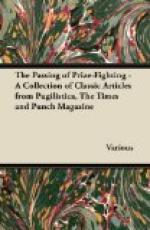In Dear Brutus the contrast between real life and the life of Magicland is sharply accentuated by the fact that there is not a separate set of characters for each; the same men and women figure in both, making abrupt transitions from one to the other and back again. We have a house party of actual humans (not too obtrusively actual), most of whom, including the butler, imagine that if they could have a Second Chance in life they would not make such a mess of it as they did with the First. One of them thinks he would never have taken to drink and lost his self-respect and his wife’s love if he had only had a child; one that he would not have become a pilferer if he had stuck to the City; others that they would have done better to have married Somebody Else. Well, they are all whisked off into the Magic Wood, and there they get their Second Chance. The pilferer becomes a successful tradesman in a large and questionable way; the tippler finds himself sober and attended by the daughter of his heart’s desire; various married folk get re-sorted; and so forth.
The moral purpose (if any) of the author, as conveyed to us through the mouth of the leading humourist of the party, is to show that a man’s nature would remain the same even if he got a Second Chance. Unfortunately—but what can you expect in the realm of Magic?—the scheme does not work out with any logical consistency. It is true that the philanderer and the pilfering butler show little promise of making anything out of their Second Chance; but, on the other hand, the childless tippler seems to have gone reformation and recovered his wife’s regard; and if I rightly interpret certain delicate indications, they propose to have a pearl of a daughter later on. Also the dainty and supercilious Lady Caroline, who in the wood becomes enamoured of the butler-turned-plutocrat (cf. Titania and Bottom) and subsequently returns to her sniffiness, cannot be said to have lost much by failing to utilise her Second Chance.
However, one might never have troubled about Sir JAMES’S logic if he had not declared his moral purpose in set terms. I suppose he had to explain his title, which was sufficiently obscure. It comes, as Mr. SOTHERN kindly informed us, from the lines:—
“The fault, dear Brutus, is not
in our stars,
But in ourselves.”
Brutus, in fact, is the famous general to whom certain things were caviare. He is the typical man in the audience, to whom Sir JAMES says: “You, too, Brutus; I’m talking at you.”
[Illustration: IN AND OUT OF THE WOOD.
Mr. Purdie MR. SAM SOTHERN. Mr. Coade MR. NORMAN FORBES. Mr. Dearth MR. GERALD DU MAURIER.]
Happily (for my taste, anyhow) the humour of the play dominates its sentiment. And where the sentiment of the child Margaret threatens to overstrain itself we had always the healthy antidote of Mr. DU




